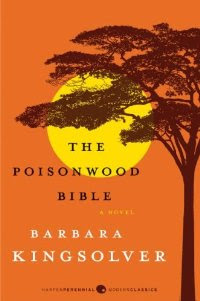Book show how the west owes Africa more than an apology for colonialism
 |
In the Poisonwood Bible, author Barbara
Kingsolver shows how the western citizens had reaped from crimes
orchestrated by their governments against the Africans. The citizens themselves
may not have directly approved of these crimes but are undergoing cultural
guilt over the same.
Set during Congo's emergence from the post
colonial era, the story is narrated by five women. Nathan Price, the
protagonist hardly given a voice, brings his family of a wife and four
daughters from Georgia State in US to Kilanga, a village in the then Belgian
Congo close to the Kwilu River. He's a Second World War veteran and the sole
survivor from his battalion that perished in the historical Bataan Death March.
He takes this as a miracle and a call and is soon ordained an evangelical
Baptist Minister. His religion overzealousness drives him to Africa to 'save
Africa for Jesus' without the Mission's League blessings.
Nathan typifies a conqueror's mindset and
stands for the US and the Belgian colonialists, the arrogant missionaries who'd
sowed strife with their doctrinal winds and those foreigners who, through
blinded arrogance, had destroyed the continent.
He doesn't learn about the culture of those
around him and believes Africans are ridiculous savages who must assimilate
fast to white man's culture. His seemingly right suited culture in context is
whoever wrong to the prevailing ones around him and he fails to understand
this. His family initially took his view stand before the 'savages' fleshed out
as human beings immersed in their own sophisticated and complex culture.
The Congolese and Africans in general, he
believes, are a backward people incapable of growing their own food. They're of
an inferior reasoning capacity and he wouldn't take advice from the 'race of
Ham' steeped in ignorance. When Mama Tataba, their live in house help, warns
him against touching and uprooting a certain tree, he ignores the advice. The 'bangala'
tree is known by the locals to cause swellings on the body or sudden death when
burned and its smoke inhaled. He too wouldn't hear her about baptizing people
in the river where a crocodile mauled a local girl to death forcing her to
leave him and his family.
In Lingala speak; 'bangala' has two
meaning. When slowly said, it means, 'dearly beloved' and 'Poisonwood tree'
when quickly said. Because of this cultural hubris and blind arrogance, Nathan,
who's a fast speaker, keeps intoning that 'Tata Jesus is bangala' in his weekly
sermons meaning Jesus is a Poisonwood tree! He fronts a Saviour the local sees as a dangerous
force to be avoided with church membership made mainly of outcasts and society
rejects.
The hypocrisy of the west towards Africa is
shown through how democracy is imposed. The west touts superiority of elections
and the majority rule but doesn't instill the same. They want a minority one
with a sense of democracy to protect their vast interests.
When Tata Ndu, the village Chief of Kilanga,
declares in one of Nathan's sermon his subject will have to vote between
Christianity and traditional religion, Nathan terms this as blasphemy. He fails
to realize the west imported to Africans this culture of majority's choice and
now it was being turned against itself. He acquiesces and Jesus (Christianity)
loses by 45 votes to the African religion that garners a majority 56!
In his inauguration speech as Congo's Prime
Minister, Patrice Lumumba says Congo must stand as the continent's 'heart
of light'. This sharply contrasts Joseph Conrad's depiction of the
same as 'Heart of Darkness'
where Africans are portrayed as brutal and primeval. The author avers that
'darkness' doesn't emanate from Africa but refers to west's oppression of the
continent. It stands for greed and hubris in the hearts of men like Nathan and
his ilk.
Using symbolism of Methuselah, a caged parrot later set free
but killed by a civet cat on Congo's Independence Day, the author shows how US destabilised the new Congo. There was hardly
a training period for transition of power to the Africans making them, like
Methuselah, vulnerable and dependent on former masters despite their
liberation. This vulnerability was exploited with devastating consequences to
the continent. Western nations bankrolled coups in new African states and
propped up their own puppets to cater for their interests.
Dwight
Eisenhower, then American president, orders CIA to exterminate Lumumba and
installs the dictator Mobutu Sese Seko.
Mobutu amasses all the country's wealth revenue consigning millions to grinding
poverty.
Britain tried to assuage her guilt ridden
conscience by offering out of court payments to elderly Mau Mau survivors.
Kenya, and Africa, doesn’t need little compensation deals. It needs
reparations.



Comments
Post a Comment